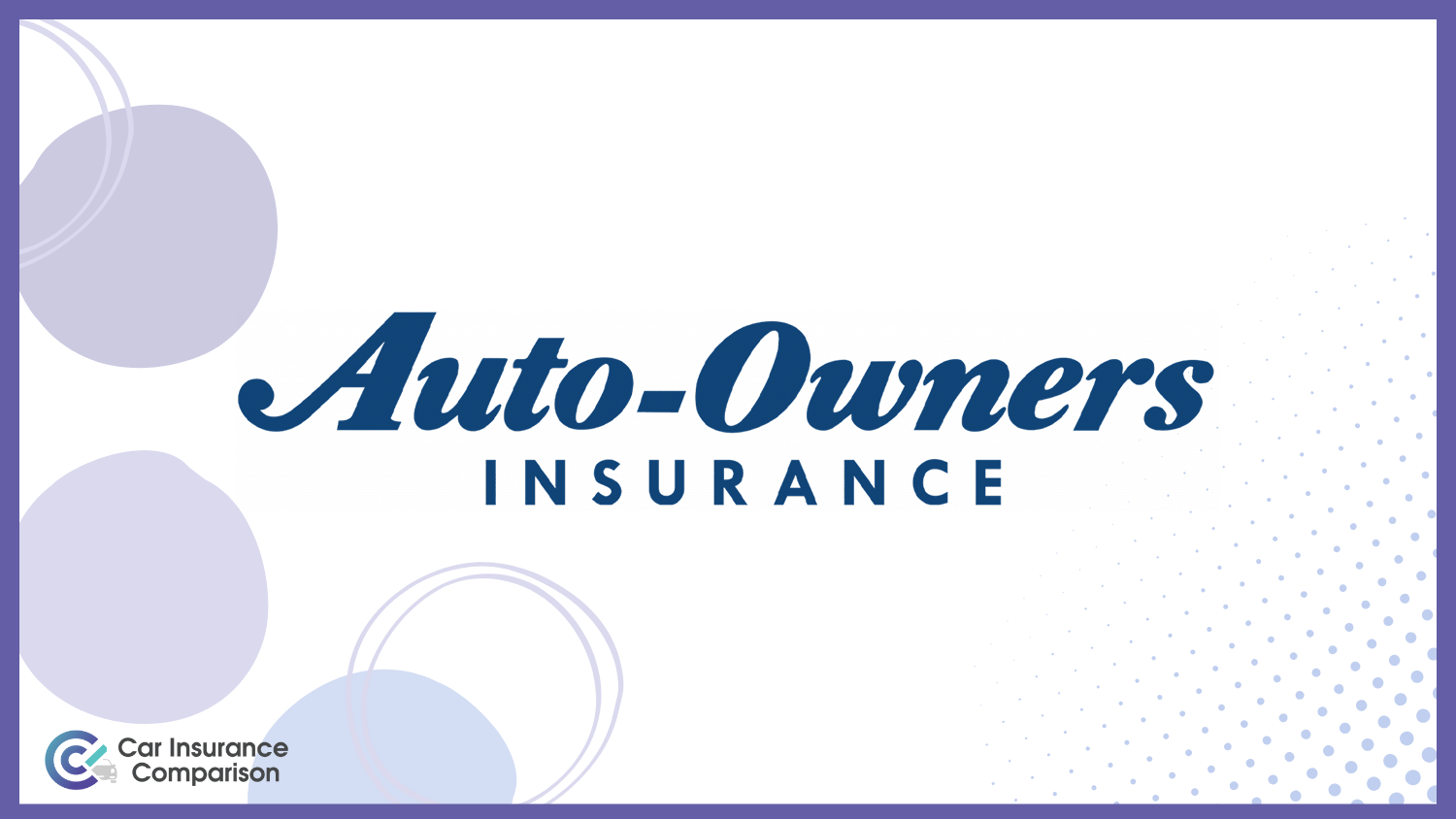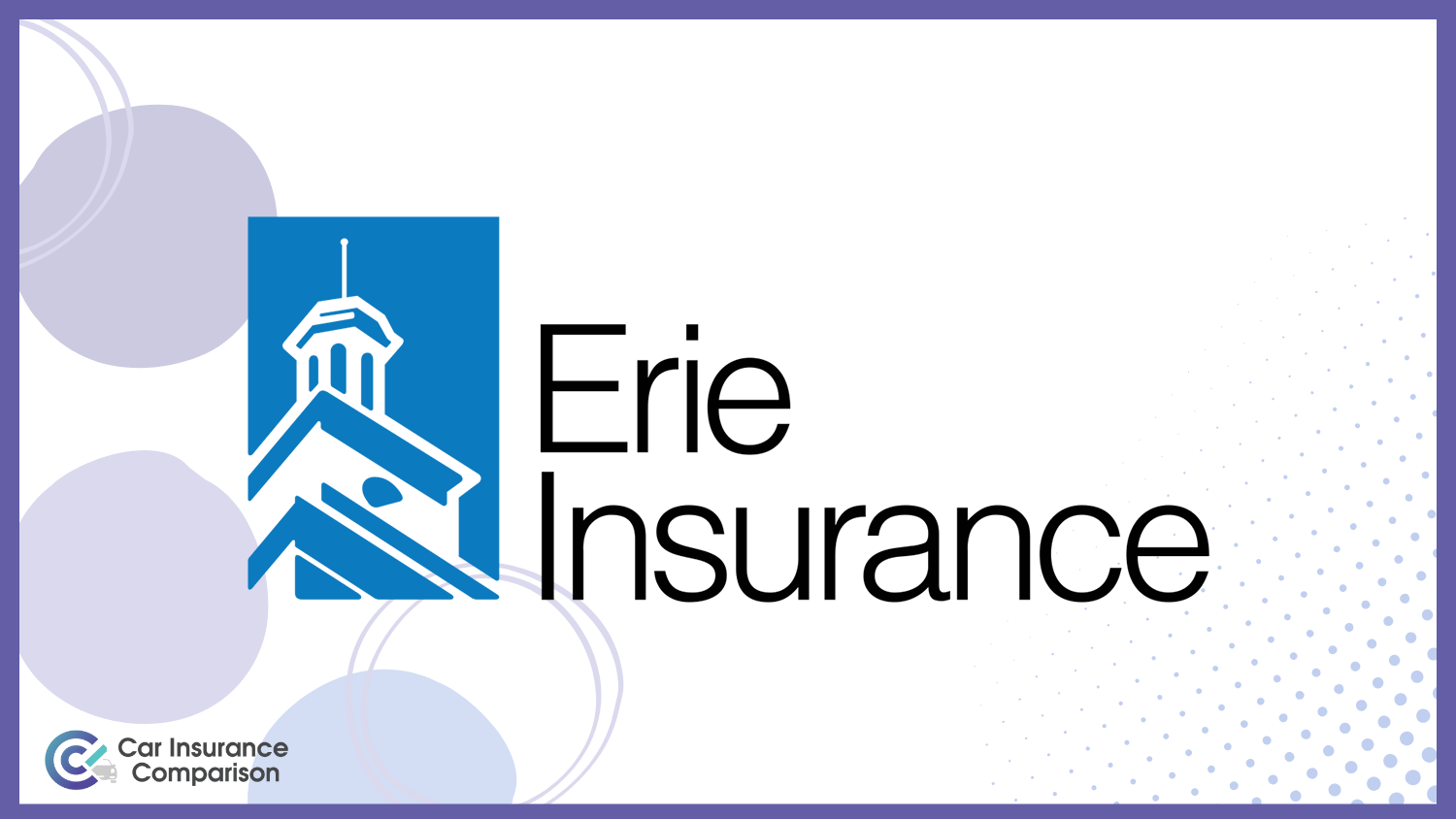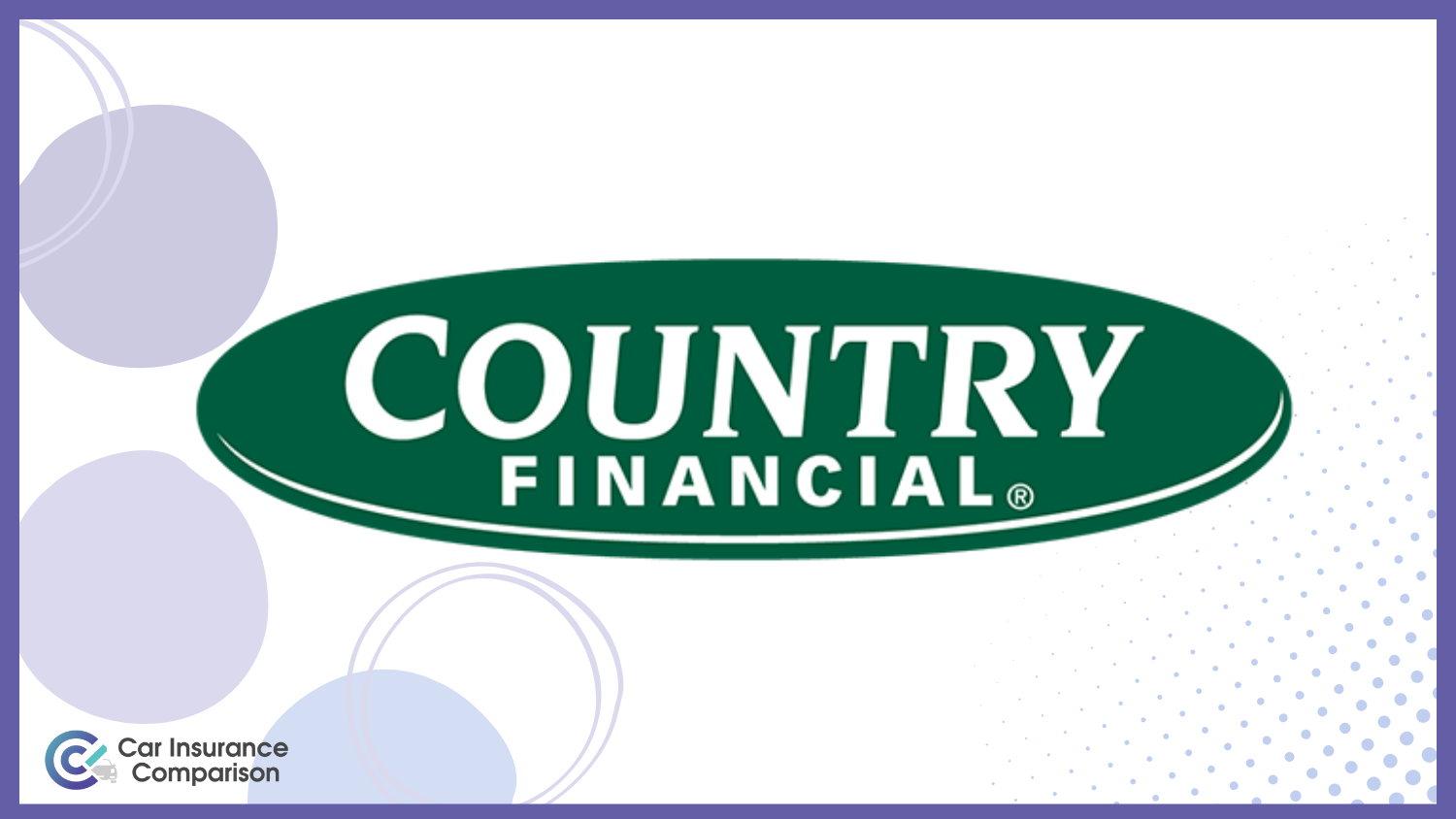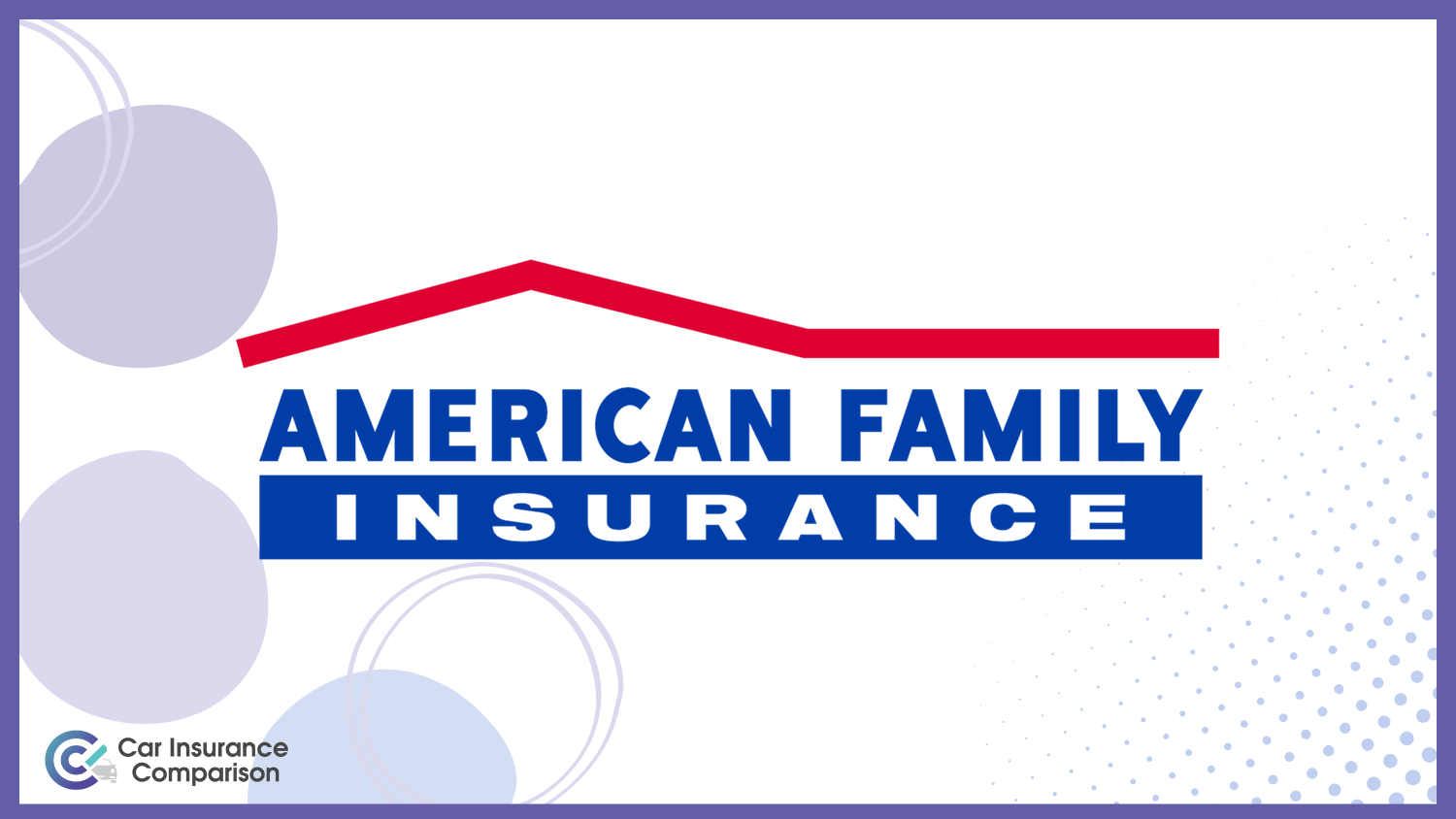Cheap Car Insurance for Older Vehicles in 2025 (Save Money With These 8 Companies)
Auto-Owners, Erie, and Geico are the top choices for cheap car insurance for older vehicles. Auto-Owners' average minimum rate for old cars is $27/mo. You may want to carry just minimum coverage if your car isn’t worth much, but if it's a valuable older vehicle, you may want classic car insurance.
Free Car Insurance Comparison
Compare Quotes From Top Companies and Save
Secured with SHA-256 Encryption
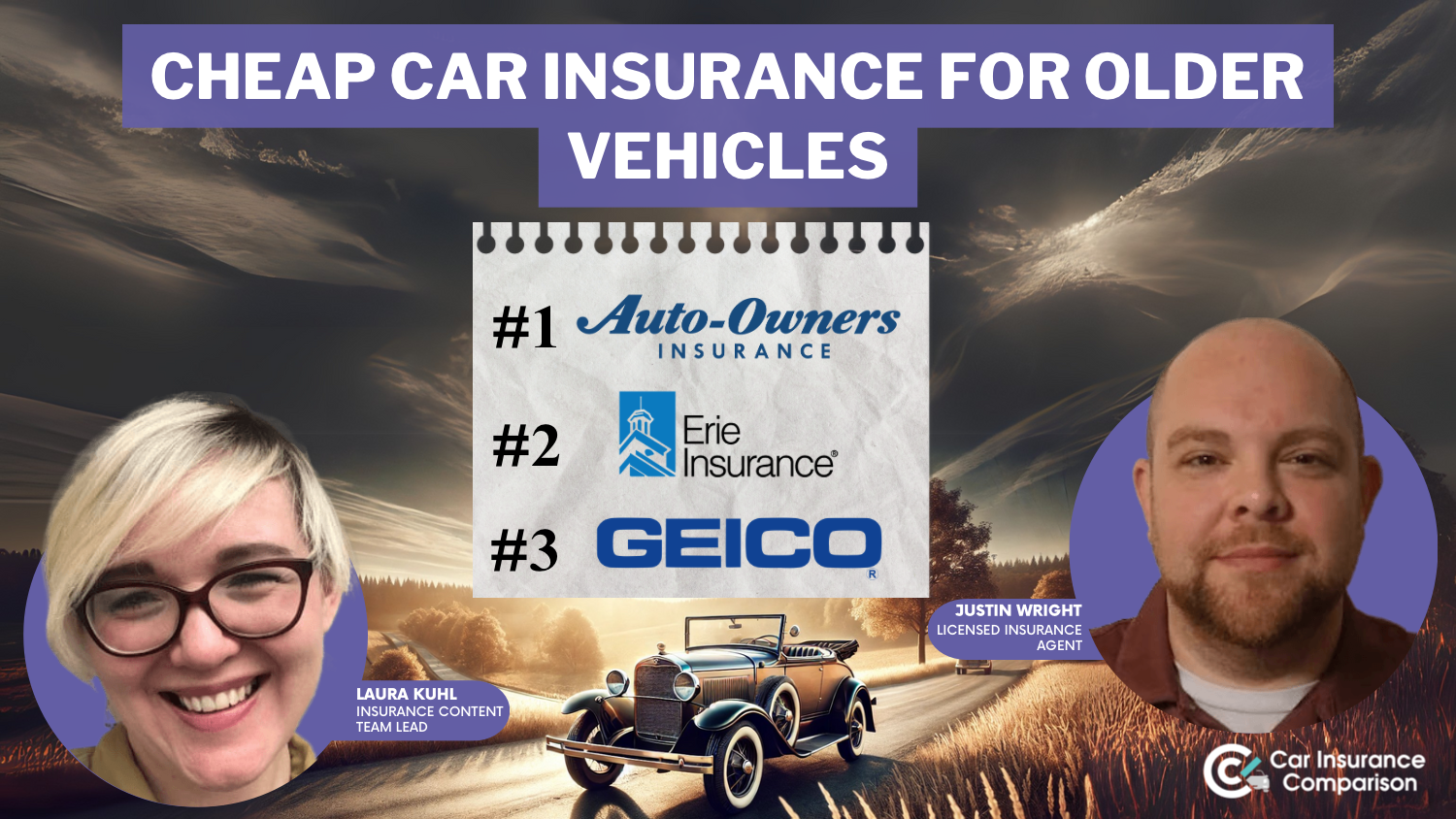
Justin Wright
Licensed Insurance Agent
Justin Wright has been a licensed insurance broker for over 9 years. After graduating from Southeastern Seminary with a Masters in Philosophy, Justin started his career as a professor, teaching Philosophy and Ethics. Later, Justin obtained both his Property & Casualty license and his Life and Health license and began working for State Farm and Allstate. In 2020, Justin began working as an i...
Licensed Insurance Agent
UPDATED: Jan 29, 2025
It’s all about you. We want to help you make the right coverage choices.
Advertiser Disclosure: We strive to help you make confident car insurance decisions. Comparison shopping should be easy. We are not affiliated with any one car insurance company and cannot guarantee quotes from any single company.
Our partnerships don’t influence our content. Our opinions are our own. To compare quotes from top car companies please enter your ZIP code above to use the free quote tool. The more quotes you compare, the more chances to save.
Editorial Guidelines: We are a free online resource for anyone interested in learning more about auto insurance. Our goal is to be an objective, third-party resource for everything auto insurance related. We update our site regularly, and all content is reviewed by auto insurance experts.
UPDATED: Jan 29, 2025
It’s all about you. We want to help you make the right coverage choices.
Advertiser Disclosure: We strive to help you make confident car insurance decisions. Comparison shopping should be easy. We are not affiliated with any one car insurance company and cannot guarantee quotes from any single company.
Our partnerships don’t influence our content. Our opinions are our own. To compare quotes from top car companies please enter your ZIP code above to use the free quote tool. The more quotes you compare, the more chances to save.
On This Page
 563 reviews
563 reviewsCompany Facts
Min. Coverage for Older Cars
A.M. Best Rating
Complaint Level
Pros & Cons
 563 reviews
563 reviews 1,883 reviews
1,883 reviewsCompany Facts
Min. Coverage for Older Cars
A.M. Best Rating
Complaint Level
Pros & Cons
 1,883 reviews
1,883 reviews 19,116 reviews
19,116 reviewsCompany Facts
Min. Coverage for Older Cars
A.M. Best Rating
Complaint Level
Pros & Cons
 19,116 reviews
19,116 reviewsThe top picks for cheap car insurance for older vehicles are Auto-Owners, Geico, and Erie.

The best type of car insurance for older cars depends on the overall value of your vehicle and whether it’s a classic or not. You will always need to carry liability car insurance on your older car. Still, optional car insurance coverages like collision coverage or comprehensive coverage aren’t always necessary on an older vehicle that has significantly depreciated in value.
Our Top 8 Company Picks: Cheap Car Insurance for Older Vehicles
| Company | Rank | Monthly Rates | Safety Features Discount | Best For | Jump to Pros/Cons |
|---|---|---|---|---|---|
| #1 | $27 | 10% | Custom Coverage | Auto-Owners | |
 | #2 | $31 | 5% | Great Service | Erie |
| #3 | $34 | 25% | Online Experience | Geico | |
| #4 | $40 | 10% | Agent Network | State Farm | |
| #5 | $48 | 5% | Customer Satisfaction | Country Financial | |
 | #6 | $52 | 5% | Nationwide Coverage | Nationwide |
| #7 | $57 | 10% | Coverage Options | Travelers | |
| #8 | $68 | 5% | Discount Variety | American Family |
Read on to learn more about older car insurance. We’ll cover everything about older car insurance, such as required coverages, classic car insurance, optional coverages, and more. You can also get free quotes by entering your ZIP code into our tool.
- Auto-Owners has the cheapest car insurance for older vehicles
- Cars that haven’t depreciated much in value should carry full coverage insurance
- Cars that break down frequently should have roadside assistance coverage
#1 – Auto-Owners: Top Pick Overall
Pros
- Custom Coverage: Auto-Owners offers custom coverage for classic cars or modified cars.
- Roadside Assistance: Great for older cars that might break down. Discover more coverages in our Auto-Owners review.
- Discount Variety: Auto-Owners offers discounts for paying in full, going paperless, and more.
Cons
- Availability: Unfortunately, coverage is not offered in every state.
- Virtual Tools: There may not be as many online tools and resources offered as at other companies, such as a UBI tracking program for adults.
Free Car Insurance Comparison
Enter your ZIP code below to view companies that have cheap car insurance rates.
Secured with SHA-256 Encryption
#2 – Erie: Best for Great Service
Pros
- Great Service: Erie is highly rated by customers for its service. Learn more in our Erie review.
- Multi-Policy Discount: Erie also sells home, life, and business insurance.
- Classic Car Insurance: Get specialized coverage if you have a classic or collector car.
Cons
- Availability: There are only a few states that carry Erie auto insurance.
- Agent Claims Only: You can’t file online.
#3 – Geico: Best for Online Experience
Pros
- Online Experience: Geico has one of the best online experiences due to its user-friendly app.
- Roadside Assistance: Great for older vehicles. Learn about Geico’s coverages in our Geico review.
- Classic Car Coverage: Get specialized collector or classic car insurance from Geico.
Cons
- Local Agents: Geico’s local agent locations are limited.
- Coverage Availability: A few add-on coverages may not be sold at some locations.
#4 – State Farm: Best for Agent Network
Pros
- Agent Network: Local agents are near most customers. Read more in our State Farm car insurance review.
- Financial Reputation: Your older car insurance will be backed by a financially sound company.
- Classic Car Insurance: Vintage car insurance is available at State Farm.
Cons
- DUI Rates: Expensive rates for high-risk DUI drivers.
- Accident Forgiveness: Most drivers won’t be able to qualify for State Farm’s accident forgiveness.
Free Car Insurance Comparison
Enter your ZIP code below to view companies that have cheap car insurance rates.
Secured with SHA-256 Encryption
#5 – Country Financial: Best for Customer Satisfaction
Pros
- Customer Satisfaction: Country Financial’s customer satisfaction is higher than other companies (learn more: American Family vs. Country Financial Car Insurance Comparison).
- Multiple Discounts: There are plenty of earning opportunities, such as loyalty discounts.
- Roadside Assistance: Country Financial offers roadside assistance and towing coverage.
Cons
- Availability: Country Financial isn’t available in all states.
- High-Risk Rates: Other companies may offer more competitive rates for high-risk drivers.
#6 – Nationwide: Best for Nationwide Coverage
Pros
- Nationwide Coverage: Auto insurance is available in all but a few states.
- Classic Car Coverage: Coverage for classic and collector cars is available at Nationwide.
- Roadside Assistance: Add to your older vehicle insurance policy.
Cons
- Bundling Choices: Bundling discounts are limited to specific combinations. Learn more in our article on Nationwide discounts.
- Claims Processing: There have been some reviews stating there are delays with processing.
#7 – Travelers: Best for Coverage Options
Pros
- Coverage Options: There are plenty of different options to add to an older vehicle insurance policy.
- Roadside Assistance: A great coverage for your older vehicle policy.
- Multi-Policy Discount: Travelers also sells home insurance, business insurance, and more.
Cons
- IntelliDrive Program: The program raises rates for unsafe drivers.
- Customer Reviews: There are a few complaints about customer service. Learn more in our Travelers review.
Free Car Insurance Comparison
Enter your ZIP code below to view companies that have cheap car insurance rates.
Secured with SHA-256 Encryption
#8 – American Family: Best for Discount Variety
Pros
- Discount Variety: There are plenty of discounts that can be applied to an older car insurance policy.
- Customer Service: Highly rated by most customers. Learn more in our American Family car insurance review.
- Roadside Assistance: Add for towing and repair help with your older vehicle.
Cons
- Availability: A few states don’t carry auto insurance.
- High-Risk Rates: Rates aren’t as competitive for high-risk customers.
Best Type of Car Insurance for Older Cars
When considering the best old vehicle insurance, determine the insurance requirements in your state (learn more: Minimum Car Insurance Requirements by State). Then, you need to check its overall value and whether it counts as a classic. We’ve outlined how to pick the best car insurance for your older vehicle below.
Required Car Insurance for Older Cars
Almost every state requires drivers to carry liability insurance for older cars. The coverage amount varies from state to state, but no matter how old your car is, you need to have liability insurance on it. Liability insurance often includes bodily injury and property damage. These liability coverages pay for the other driver’s repairs and medical bills up to a certain amount.
No matter what type of older vehicle you drive, it’s best to have higher liability coverage than the minimum required amount, as full coverage car insurance for old cars will better protect you if you cause an expensive accident.
Classic Car Insurance for Older Cars
Generally, when buying insurance for cars older than 20 years, your insurance company will likely consider cars this old a classic car. Older cars may be worth more than the depreciated value, especially if they are classic collector cars.
However, you must also meet the driving requirement for your car to be considered classic.
You can’t use your classic car for everyday driving. Instead, classic car insurance is for rarely used older cars. Since older cars use a lot of gas and are less dependable on the roads, most drivers don’t use their older cars frequently if they’re classics.
Suppose you qualify for a classic car insurance policy. In that case, you should purchase it over regular car insurance, as a classic car policy better considers your car’s actual value, especially if you’ve had work done to it. The best classic car insurance also offers total protection for your vehicle, including liability, collision, and comprehensive coverage.
Optional Coverages for Older Cars Not Depreciated in Value
If your car hasn’t significantly depreciated in value, it’s usually worth carrying more than the minimum coverage. Wondering can I get full coverage on an old car? Absolutely. Higher coverage levels ensure you’ll receive your car’s value after an accident, rather than just being protected from liability issues.
If your car still has good value, you might want to consider the following insurance for older cars. Most of these coverages will protect your assets in a car crash, whereas roadside assistance is good for breakdowns:
- Collision Coverage: If you crash into another car or object, collision coverage will pay for repairs to your older vehicle.
- Modified Car Coverage: You should get modified car insurance coverage if you’ve had any work done to your older car, such as adding tinted windows or a custom paint job (read more: Does car insurance cover paint jobs?).
- Comprehensive Coverage: Comprehensive coverage helps pay for repair costs from several non-collision incidents, such as vandalism, natural disasters, animals, and more.
- Roadside Assistance: Older cars may break down more often. Roadside assistance helps with towing, jump-starts, and more.
So, should you have full coverage on a 10-year-old car or older? If your vehicle is worth a lot or you’ve had expensive modifications done to make your car a hot rod, you should consider adding on some or all of the above coverages (read more: Best Hot Rod Car Insurance). Otherwise, if your older vehicle is in an accident, you’ll have to pay for repairs yourself or consider totaling the car.
Coverages to Consider Dropping for Greatly Depreciated Cars
If your car has depreciated in value so much that it is worth very little, you should consider dropping optional coverages and carrying only liability insurance.
The Insurance Information Institute recommends the following rule of thumb: If your vehicle is worth less than 10 times your vehicle’s premium, you can consider getting rid of extra coverages like collision and comprehensive insurance. The Institute recommends this because what you’re paying for monthly rates will likely equal the car’s value in a few years.
If you're unsure what your car is worth, you can visit a site like CARFAX or Kelley Blue Book to check the value of similar used makes and models. You can also ask your insurance company to estimate your car's value.
Brandon Frady Licensed Insurance Agent
If you have a lease or loan on your vehicle, you’re probably required to have comprehensive and collision coverages. The company that gave you the lease or loan wants to protect its assets, so there’s usually a requirement in your contract to carry comprehensive and collision coverages, as these coverages will pay for vehicle collisions and damages from natural disasters.
Read more: Compare Car Insurance for Natural Disasters: Rates, Discounts, & Requirements
You can only consider dropping additional required coverages once you fully pay off your vehicle. However, you should only do this if you meet the 10% above rule.
Free Car Insurance Comparison
Enter your ZIP code below to view companies that have cheap car insurance rates.
Secured with SHA-256 Encryption
How to Find Cheaper Insurance for an Older Car
There are numerous ways to reduce your rates on car insurance for an older car outside of dropping optional car insurance coverages. To start, take advantage of all available car insurance discounts, from paperless discounts to safe driving discounts.
If you don’t want to drop coverages, the following tips can help you get cheap old car insurance:
- Raise deductibles. Raising your deductible will reduce your overall rate, but you’ll want to ensure you’re willing to pay the deductible if you get into an accident.
- Shop around. One of the best ways to find cheaper rates is to shop around and get quotes from different insurance providers.
If you don’t feel comfortable dropping optional coverages on your car, even if it’s no longer worth much, you can still save while keeping full coverage on your older car. If you think you’ll end up paying more than your car’s worth in insurance rates over a few years, it’s probably best to eventually cut your coverages or raise your deductible.
Compare Older Vehicle Insurance Rates
Insurance for older cars may need more coverage than the minimum requirement depending on the state. Older cars are often good choices for teen drivers, so insurance is especially important. What insurance should you get for an old car? Old cars that are worth less can get just minimum coverage, while more valuable cars will benefit from full coverage.
Car Insurance for Older Vehicles by Coverage Level & Provider
| Insurance Company | Minimum Coverage | Full Coverage |
|---|---|---|
| American Family | $68 | $134 |
| Auto-Owners | $27 | $83 |
| Country Financial | $48 | $110 |
| Erie | $31 | $91 |
| Geico | $34 | $105 |
| Nationwide | $52 | $125 |
| State Farm | $40 | $114 |
| Travelers | $57 | $130 |
When you own an older car, insurance is still necessary. Even though you may not feel like your beat up car is worth a whole lot, you still need to have some type of insurance coverage.
Car insurance is needed for many reasons. By understanding these reasons, you can find affordable car insurance for your older car. To find good rates, get quotes from the cheapest companies like Auto-Owners, Erie, or Geico.
Legal Requirements for Old Car Insurance
All 50 states require some type of car insurance or proof of financial ability to pay large amounts of damage as a requirement to drive. Some states are stricter than others about required amounts of coverage.
Requirements for insurance are determined by statistics within your state about:
- drivers
- accidents
- violations
Ignoring your state’s law because you drive an older vehicle is not wise. The penalty for driving without insurance can range from a ticket to loss of license to jail time for repeat offenders.
No matter how old your car is, you still have to have the required amount of car insurance as indicated by your state.
Most states require some type of bodily injury and property damage coverage. Other car insurance features that are not required by law such as comprehensive coverage can be dropped on an older vehicle.
Most drivers have comprehensive coverage on their vehicle when it is newer or when they still owe money on a car loan. However, once your car is paid off, you have the option to drop comprehensive coverage.
How Old Car Insurance Protects Your Finances
No matter how old a vehicle is, it can still do damage in an accident. The damage can be to the driver, passengers, other vehicles, people outside the vehicle, or to someone’s property. If you don’t have insurance, you can be sued by the injured or damaged party.
Lawsuits can ruin you financially by causing you to lose your savings, home, or wages. Carrying car insurance is the only way to ensure that you will be protected financially.
You can still be sued for more than the amount of your insurance policy, but at least having some coverage will help you in a court case.
Bodily injury insurance will cover any injuries done to you or your passengers while driving the vehicle. Property damage covers any damage done to another person’s property or another vehicle.
Insurance protects you from having to pay too much out of pocket.
Older Cars For Teens
Many older cars are obtained by teenagers either from a parent or relative. If you have a teenager driving an older car, insurance is necessary. Teens have seven times more accidents than adults. As they are learning to drive, accidents are bound to happen.
According to the Insurance Information Institute, teens have the highest risk of being the cause of an accident. What’s more, teen drivers also have the highest risk of causing an accident that can lead to death. A teen with a brand-new car with all of the bells and whistles will have to pay, at least, double or even triple what an adult with driving experience would pay for the same vehicle.
View this post on Instagram
That means if you have a comprehensive and collision plan for yourself that costs $90/mo then you can expect to pay more than $175/mo for your teen driver. For an older car, especially one that isn’t financed, you could spend only $67 to $75/mo for your teen’s insurance.
Many cars, even as far back as the 1990s, have modern safety devices, such as airbags and anti-lock brakes. Choosing a car like this would prove to be financially beneficial, and you wouldn’t have to worry about your teen wrecking a car that is worth a lot of money (For more information, read our “Compare Best Car Insurance Companies for Financed Cars“).
Finding cheap car insurance for young drivers is not easy. Older cars for teens make sense because they will often cost less to insure than newer models.
Teenagers need to be protected by insurance not just to protect their parents’ finances but to protect themselves as well. Anyone 18 or older can be sued if they are the cause of an accident or property damage.
Having the right insurance coverage for a teen driver is important to protect that teenager’s future. Even on older vehicles, you may want to add collision insurance in case your teen gets into an accident that is the older driver’s fault. Collision will provide money for the repairs.
Free Car Insurance Comparison
Enter your ZIP code below to view companies that have cheap car insurance rates.
Secured with SHA-256 Encryption
The Final Word on the Best Type of Car Insurance for an Older Car
The best car insurance type for your older car depends on whether it’s a classic and its overall value. If your vehicle isn’t worth much, you may be able to carry the bare minimum coverage. However, if your car is classic or still worth a significant amount, such as a car you bought at a classic car auction, you should carry full coverage to avoid a financial loss after an accident (learn more: Cheap Insurance for Car Auctions).
If your car is worth more and needs fuller coverage, shopping around for insurance quotes can help you find a better rate for your older car. Enter your zip code now to find affordable car insurance quotes.
Frequently Asked Questions
Do I need car insurance for an older car?
While car insurance requirements vary by state, it’s generally recommended to have insurance for all vehicles, including older cars.
Even though older cars may have a lower market value, insurance can still provide important coverage, such as liability protection in case of an accident or coverage for damage caused by other perils like theft, vandalism, or natural disasters.
If you need temporary insurance, you can always shop at pay-as-you-go companies like Hugo insurance. Hugo car insurance is great for old vehicles that will soon be sold and only need insured temporarily.
What types of car insurance coverage are available for older cars?
Several types of car insurance coverage are available for older cars, including:
- Liability Coverage: This is the basic coverage that most states require. It helps cover the costs if you cause an accident that damages another person’s property or injures someone.
- Collision Coverage: This coverage helps pay for repairs to your own vehicle if it’s damaged in a collision, regardless of who is at fault.
- Comprehensive Coverage: This coverage helps protect against non-collision-related damages, such as theft, vandalism, fire, or damage from natural disasters.
- Uninsured/Underinsured Motorist Coverage: This coverage helps protect you if you’re involved in an accident with a driver who doesn’t have insurance or doesn’t have enough insurance to cover the damages.
If your car is no longer worth much, however, you may be able to skip collision and comprehensive insurance.
Are insurance rates generally higher for older vehicles?
In general, insurance rates for older vehicles tend to be lower compared to newer ones. This is primarily because older vehicles typically have lower market values and are often less expensive to repair or replace. As a result, insurance companies usually consider them to be less risky to insure, leading to cheap car insurance rates.
What factors determine the insurance rates for older vehicles?
While older vehicles generally have lower insurance rates, several factors still come into play when determining the specific premium for a particular vehicle.
These factors may include the vehicle’s make, model, year, mileage, safety features, and the driver’s personal factors such as driving history, age, and location. Insurance companies evaluate these variables to assess the overall risk associated with insuring an older vehicle.
Do older cars require more insurance coverage than the minimum requirement?
Insurance coverage for older cars may need to exceed the minimum requirement depending on the state. This is particularly important when the car is driven by teen drivers.
Can I lower my car insurance premiums for an older car?
There are several ways to potentially lower your car insurance premiums for an older car:
- Choose a Higher Deductible: Increasing your car insurance deductible—the amount you pay out of pocket before insurance coverage kicks in—can lower your premium. Just make sure you can afford the higher deductible if you need to make a claim.
- Consider Dropping Collision Coverage: If the cost of collision coverage exceeds the value of your older car, you might consider dropping it and relying on savings or purchasing another vehicle if an accident occurs.
- Explore Discounts: Many insurance providers offer discounts based on factors such as safe driving history, low mileage, or bundling policies (such as combining auto and home insurance). Inquire with your insurance provider about available discounts.
- Maintain a Good Driving Record: A clean driving record with no accidents or traffic violations can help keep your insurance premiums lower.
Following the tips above will help keep your rates low.
Can comprehensive coverage be dropped on older vehicles?
Yes, comprehensive coverage, which is not legally required, can be dropped on older vehicles once they are paid off. Find affordable coverage today by using our free quote comparison tool.
How can I compare car insurance for older cars?
When comparing car insurance for older cars, consider the following factors:
- Coverage Options: Review the available coverage options and ensure they meet your needs and budget.
- Premium Costs: Compare premium quotes from multiple insurance providers to find the best rate for the coverage you need.
- Deductibles and Coverage Limits: Evaluate the deductibles and coverage limits for each policy. Consider your financial situation and the value of your older car when choosing the appropriate amounts.
- Discounts and Benefits: Inquire about any discounts or benefits offered specifically for older cars. Some insurance providers may offer specialized coverage or discounts tailored to older vehicles.
Use our free quote tool if you want to compare old car insurance today.
Why is insurance important for older cars driven by teens?
Insurance is crucial for older cars driven by teens, such as 17-year-olds, because teen drivers have a higher accident rate (learn more: Best Car Insurance for 17-Year-Olds). Insurance provides financial protection for both the driver and any potential damages or injuries caused.
Should I consider specialized insurance for classic or vintage cars?
Yes, if you own a classic or vintage car, it is generally advisable to consider specialized insurance coverage. Standard auto insurance policies may not adequately cover the unique needs of these vehicles, which often have higher values and require specialized maintenance and repairs.
Classic car insurance policies are specifically designed to protect against the risks associated with owning and maintaining vintage vehicles, including coverage for agreed-upon values, restoration costs, and coverage for events like car shows and parades.
Speak with insurance providers who specialize in classic car insurance to understand your options and obtain appropriate coverage.
Are there legal requirements for car insurance?
Yes, all 50 states have some form of car insurance requirements or proof of financial responsibility to drive. The required coverage amounts vary from state to state (read more: Compare Car Insurance Rates by State).
How does insurance protect your finances?
Carrying insurance ensures financial protection in case of accidents or damages. Without insurance, you can be sued and face significant financial loss, including the potential loss of savings, home, or wages.
Should I buy car insurance for my antique car or should I use homeowners insurance?
This is actually a very good question because you don’t want to pay for car insurance that you don’t need. However, if your antique car is a registered vehicle, you will be required to carry at least liability coverage when you drive, which you can bundle with your home insurance (read more: 10 Best Companies for Bundling Home and Car Insurance).
Another option to consider is that your car may be protected under your homeowner’s insurance. It is important to note that a standard homeowners policy does not cover antiques—you will need to specifically name your car and its value on such a policy.
If you aren’t certain about which course you should take, you should consider speaking to an antique car insurance specialist. They should be able to give you the answers you need to make an informed decision about what type of insurance to purchase.
Free Car Insurance Comparison
Enter your ZIP code below to view companies that have cheap car insurance rates.
Secured with SHA-256 Encryption
Justin Wright
Licensed Insurance Agent
Justin Wright has been a licensed insurance broker for over 9 years. After graduating from Southeastern Seminary with a Masters in Philosophy, Justin started his career as a professor, teaching Philosophy and Ethics. Later, Justin obtained both his Property & Casualty license and his Life and Health license and began working for State Farm and Allstate. In 2020, Justin began working as an i...
Licensed Insurance Agent
Editorial Guidelines: We are a free online resource for anyone interested in learning more about auto insurance. Our goal is to be an objective, third-party resource for everything auto insurance related. We update our site regularly, and all content is reviewed by auto insurance experts.


